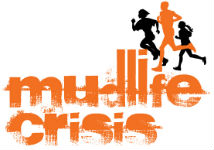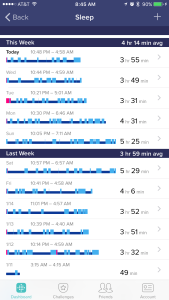Back on Christmas, I received a Fitbit Charge HR from my parents and love the thing (I talked about that a bit here). I love being able to track my daily steps, my average heart rate, activity minutes, etc. But one of the most valuable things I’ve been learning from having it is this: my sleep really sucks.
It’s tough for me to look at, but here’s the chart from the Fitbit iPhone app. Each of those lines is a night of sleep, and they’re broken down into the dark blue sections, when I was in deep sleep, the light blue sections, when I was restless, and the red lines, when I was awake. You’ll notice that the red is usually right at the beginning of the night’s sleep, which is fine because that’s the period where I was falling asleep, and those periods are 3-5 minutes most nights. Perfectly acceptable.
The problems are the number of times I was restless in the middle of the night, and how far apart those periods are. We’ve all heard of things like REM sleep, where we’re in that deep sleep and where most of the mental and physical repair time happens. That’s usually about a 90- to 110-minute cycle, according to this article from the National Institute of Neurological Disorders and Stroke (gulp!).
Looking at the sleep record from my Fitbit from last night, my longest uninterrupted period of sleep was from 12:29 AM to 1:22 AM. That’s obviously not quite an hour. Cue the worry, here.
If I’m not getting to the point where I’m getting REM cycles in my sleep, then my sleep isn’t doing the work for me that I need to have it do. I’m getting bodily rest, but is all that repair that the body does, both in the mind and in the body, actually happening for me?
It’s time to start taking this a bit more seriously than I was, apparently. Neurological issues run in my family, for sure – my grandmother had Alzheimer’s disease before she died and I really don’t want to go through that or put my family through it.
So what are some of the steps I’m planning on taking to fix my sleep?
Well, a trip to the doctor would probably be a good start. Sleep issues have run in my family. My brother, for example, recently had surgery to correct breathing issues he was having with his sinuses, and sinus issues definitely run in the family (at least going back to my father). I am pretty sure I have a deviated septum (based on my nostrils being two different sizes) and that could be much more of an issue than I ever thought it was. So something corrective there might be in order.
I also want to upgrade the amber glasses I wear. I am not sure they’re doing the job, as they’re just “front-facing” glasses (I don’t know the proper term, but they’re not wrap-around glasses like I see other people wearing).
The third thing I can do now is to get a better monitor for my sleep. I have been doing the Primal Blueprint 21-Day Transformation Challenge recently and have loved what it’s been doing for me as I track some of the important health facets in my life, including sleep. One of the coaches on the challenge (Adam Lambert) suggested that the Fitbit might not be the most accurate judge of sleep quality, and offered up a link to an app that he likes for this purpose. There are also some folks like Dave Asprey, The Bulletproof Executive, who has products to hack sleep that I want to look into. There is so much work going on in this realm right now that it’s really a great time to start taking this really seriously.
So that’s that. The Fitbit has done its job of informing me that there might be a problem here and now it’s my time to take on the issue. I will keep everyone posted on what I discover and how fixing the problem is going, because this is not an issue you want to ignore. Sleep is way too important to take for granted!
Share your thoughts on sleep, your questions, and the steps you’ve taken to fix it below in the comments!







